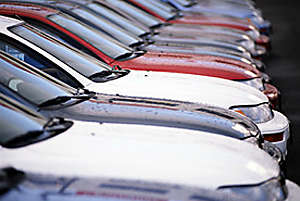
A study by the University of Michigan’s Transportation Research Institute (UMTRI) has concluded that the strategy with the best financial outcome for domestic automakers is to focus on improving fuel-economy across their lineups.
The study - Can Proactive Fuel Economy Strategies Help Automakers Mitigate Fuel-Price Risks? - refutes the industry’s assumption that customers value fuel economy only when fuel prices are high.
The paper incorporates data-driven estimates of the value of fuel economy into an automotive market simulation model that has three components: a consumer demand function that predicts consumers’ vehicle choices as functions of vehicle price, fuel price, and vehicle attributes (the new estimates of the value of fuel economy are used to set the parameters of the demand function); an engineering and economic evaluation of feasible fuel economy improvements by 2010; and a game theoretic analysis of manufacturers’ competitive interactions.
Walter McManus, head of UMTRI’s auto analysis division said:
Even the Big Three now acknowledge that high gas prices and their overdependence on fuel-inefficient SUVs and pickup trucks have accelerated their financial freefall. The findings of our report prove in sharp detail Detroit automakers’ long-term vulnerability to volatile gas prices and show that improved fuel economy fleetwide—above and beyond current regulation—is the key not just to their survival but their success, even if the price of gas goes down.
Looking ahead to the 2010 model year, the study uses three gas-price scenarios: $3.10, $2.30 and $2 per gallon. If all automakers take a proactive strategy to increasing fuel economy, the report concludes that:
McManus again:
What is surprising is that each automaker is financially safer if they follow a proactive fuel-economy strategy, regardless of what their competitors do. Sure, Ford might not capture sales if their competitors make a better car that has high fuel economy, but what is certain is that Ford cannot capture those sales without higher fuel economy.The study also estimated the impact of strategic choices by automakers on US employment. At $3.10 a gallon, a marketwide proactive fuel-economy strategy could save nearly 35,000 jobs at GM, Ford and DaimlerChrysler, while costing foreign automakers with plants in North America more than 19,000 jobs. By contrast, a business-as-usual approach could result in Big Three job losses of nearly 43,000, compared to less than 1,900 job cuts at the foreign transplants.
McManus had this counsel for the US automakers:
Automakers must decide their fuel-economy strategies for 2010 today, knowing neither the future fuel prices nor the decisions their competitors have made. With only cash on hand for one cycle of product development, as gas prices dip—for the moment—will these struggling automakers be tempted to remain dependent on their once-profitable gas guzzlers? Our report provides stark evidence that the riskiest thing domestic automakers could do is continue business as usual.
Deploying new technologies takes time and money to accomplish, and time and money are in short supply in Detroit. While management is currently focused on cutting capacity through massive layoffs, they need to undertake a deep transformation to much more fuel-efficient fleets to avoid going under. The dilemma the Detroit automakers face is that while they may believe that they cannot afford to make fuel economy a high priority, in actuality, it turns out that they cannot afford not to.
Resources:
This study concludes what has always seemed common sense to me: facing high (and increasing) gas prices over the next decades, GM, Ford and DaimlerChrysler (DCX) are simply foolish if they think they will continue to make a profit with their current business model and it's overreliance on sales of SUVs and light trucks. That strategy may have worked when gas was cheap during the 1990s, but if the Big Three arent agile or prudent enough to change strategies to adapt to a changing market, they will go under.
As a consumer, I haven't been much of a fan of the US domestic auto manufacturers, preferring instead the generally more innovative and fuel efficient vehicles produced by Japanese and European manufacturers.
However, as an American, I have no desire to see Ford, GM or DCX go under, as the blow to the US economy from any one of these three going bankrupt would be tremendous. For the sake of the US economy, I can only hope that the US Big Three wake up and pay attention to this study. As McManus pointed out, they have very little time in which to decide what products they plan to roll out a few model years from now, and the wrong decision at this point could cripple any one of the auto giants.
If any of you out there are stockholders in any of the US auto giants, I would strongly encourage you to write a letter to the company to demand that they act prudently with your investment and heed the advice of this study: fuel efficient vehicles are the best bet ... and time is running out to make the switch.













No comments:
Post a Comment